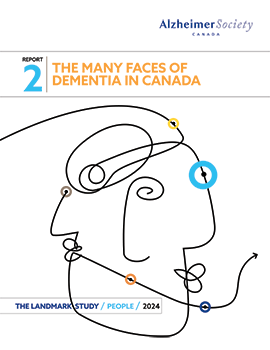THE LATEST FROM THE LANDMARK STUDY


The second Landmark Study report, The Many Faces of Dementia in Canada, offers fresh insights into understanding dementia in Canada’s diverse population over the next 30 years. Dementia is a growing public health concern, with substantial differences in risk, prevalence and outcomes among various communities. The report focuses on ethnic, racial, age, sex, and gender variations in dementia, highlighting the unique needs and experiences of each group.
Dementia and Indigenous Peoples: Research has established that health disparities faced by Indigenous Peoples are rooted in colonization and ongoing social inequities. Compared to 2020, the study estimates an increase of 273% in dementia cases amongst Indigenous Peoples by 2050. This is far greater than the overall population’s projected 187% rise, pointing to the urgent need to address Indigenous health disparities and support Indigenous-led research and care resources.
Ethnic and Racial Diversity of People Affected by Dementia: The ethnic and racial population of Canada is shifting. By 2050, 1 in 4 people living with dementia in Canada will be of Asian origin, marking a 785% increase compared to 2020. People of African and Latin/Central/South American descent will see a 507% and 434% rise, respectively. In Canada, there’s a lack of research focusing on the experiences of racialized communities and dementia. Clearly, more support for this type of research is needed.
Sex and Gender Differences in Dementia: In high-income countries, females experience dementia at a much higher rate than males. In 2020, an estimated 61.8% of persons living with dementia in Canada were female. By 2050, the study projects that women will account for over 1 million people with dementia in Canada. The report stresses the need for further research into the experiences of intersex, non-binary and genderdiverse individuals.
Young Onset Dementia: This form of dementia presents unique challenges, including a variety of symptoms and causes that can lead to delayed diagnoses. By 2050, over 40,000 people in Canada under 65 could have dementia, up from 28,000 in 2020, demonstrating the need for more research. The study emphasizes the need for awareness among healthcare workers and appropriate support systems for younger adults.
Promoting Inclusion for All People Living with Dementia: Our shared characteristics and differences are vital to planning future dementia health supports. Learning that race, ethnicity, sex, gender and dementia intersect, and understanding the impact of colonization as a determinant of health in Indigenous communities, are important first steps we can take as individuals to support the diverse people in Canada currently living with dementia, as well as those who will develop it.
THIS IS MORE THAN A REPORT. IT’S A CALL TO ACTION.
The Many Faces of Dementia in Canada report makes clear that we need to adapt how we help everyone living with dementia – including Indigenous, racialized and younger people – while supporting equal access to care, diagnosis and prevention tools. We all have a responsibility to be part of the solution.
Read the full report at alzheimer.ca/ManyFaces
